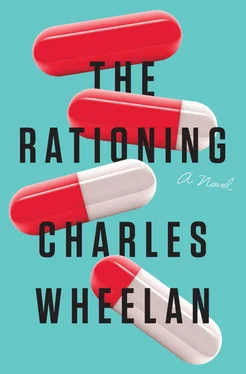It would be closer to three hours before we filed into the Cabinet Room. Only later was I able to infer what had been going on. There had been a coup attempt against the Saudi royal family early that morning by a surprisingly well-organized Islamic extremist group. The President and his team found themselves walking a fine line between protecting the Saudi government, a dependable if oppressive ally in the region, and being seen as a prop for yet another illegitimate regime. The Israelis, who often found common cause with the Saudis because they shared a common enemy (the Iranians), were pushing aggressively to put American troops on the ground in Saudi Arabia to protect the monarchy. The President had refused to commit troops; he had also warned the Israelis against any involvement other than intelligence sharing. According to one account, the President ended up in a shouting match with the Israeli Prime Minister. But I read about all this much later, at the same time everyone else did. For us, on that day, it just made for a lot of waiting.
The Chief of Staff eventually showed up at the door to our small office and invited us into the Cabinet Room. Our slides had already been loaded and were projected on small screens in front of each participant. The NIH Director walked quickly through the presentation, six slides including Tie Guy’s highly magnified photo of Dermatophagoides mensfarinae . (I was eager to tell him that his “sick” photo made the final cut.) The group had grown larger. I recognized the White House Director of Communications and the National Security Adviser from photos. As we waited for the President to appear, my cell phone beeped with a text. I would have ignored it, but we were just waiting anyway, so I checked. It was from Justman, head of the Capellaviridae task force, and said simply: “Call me.” I got the attention of the Chief of Staff to ask if there was a place where I could make a call. Before she could answer, the President walked in. The participants around the table stood up quickly.
“Sit down,” the President said sharply. It was not a “Thank you for standing up but now please be seated.” It felt more like he was annoyed that we had stood up in the first place.
“It’s the task force,” I mouthed to the Chief of Staff. She pointed to a door behind where I was sitting and motioned that I should make the call from there. I got up, drawing a look from the President, and walked out of the room into a small corridor. Justman answered right away. “You told me to call with news,” he said apologetically.
“Of course. What is it?” I asked.
“I think we finally have a little good news,” he said. “The fatality rate seems to be lower than we thought. We got another wave of data last night: public health clinics, a sampling of government workers—”
“Sorry, I’m in a meeting here. Can you just summarize for me?”
“A lot of people are fighting this thing off on their own,” he explained.
“So what’s your best guess on the fatality rate?” I asked.
“Best guess—probably three to five percent,” he said.
“Is there a pattern as to when it’s most likely to be fatal?”
“That’s about what you’d expect,” Justman said. “It’s most likely to be fatal for people who are weak or immunocompromised to begin with.”
“But there is no pattern as to when, where, or why Capellaviridae turns fatal in the first place?”
“Not yet,” Justman answered. “That could be more or less random. For now, it probably makes sense to think of it like the flu. You don’t really know who is going to get it, but among those who do get sick, it’s those who are weak to begin with—the very old, the very young, that kind of thing—who are most likely to succumb.”
“What about the college students?” I asked. “The UVM athletes?”
“If they don’t seek any treatment at all, this is still a pretty nasty illness,” Justman reminded me.
“Right,” I said. I was becoming aware of how long I had been away from the Cabinet Room. “I’ve got to go. I appreciate this. Please text me again if you learn more.”
“No problem.”
I turned the knob on the door to the Cabinet Room as quietly as I could, hoping to slip back into my chair without drawing undue attention. That was not to be. The Speaker of the House was asking something about Ohio when I walked in; the President turned to me and said acerbically, “Thank you for joining us.”
I instinctively looked to the Chief of Staff, who gave me a look that said, “Just ignore it,” like my dad turning around from the front seat of the car and admonishing me to ignore my sister’s repeated jabs in the rib cage. The NIH Director was briefing the room on our meeting with Tie Guy that morning, working her way through the six slides. I never did figure out what the Speaker had been saying about Ohio.
“We’re still looking at a huge number here,” the President said.
“It could be much worse,” the NIH Director said.
“I have some good news on that front,” I interjected. I explained what Justman had just told me.
“We’re still looking at a huge Dormigen shortfall,” the President said. “Where are we on that?”
“We’re stalled, Mr. President,” the National Security Adviser said. She was a black woman, surprisingly young-looking, who had risen through the ranks of the military. She was teaching at West Point when the President asked her to join the administration. Perhaps it was my imagination, but everything about her seemed slightly more impressive than the rest of us: she was fitter, she spoke more forcefully, she even sat straighter in her chair. “With regard to India, sir, we have moved backwards.”
“India?” the Strategist asked, genuinely perplexed. “They wanted a hundred billion dollars. How can we move backwards from there?”
“Now they are not even willing to do that,” the National Security Adviser said.
“They’ve taken that offer off the table?” the President asked.
“Yes, sir. They claim they have many untreated illnesses. The Prime Minister feels it would be inappropriate—”
“Politically stupid,” the Strategist interrupted.
The National Security Adviser looked at him sternly, clearly annoyed at being interrupted. She continued, “The Prime Minister believes it would be inappropriate to ship Dormigen out of the country at a time when there is still unmet need within the country.”
“Come on,” the Strategist said. “There is unmet need because the Indian health system is corrupt and inefficient, not because they don’t have enough Dormigen. They just can’t get it to where they need it.”
The National Security Adviser looked at the President as she answered, “Be that as it may, we cannot count on receiving any Dormigen shipments from the Indian government.”
“Not even for a hundred billion,” the President said.
“No, sir.”
“Isn’t this just a negotiation?” the Secretary of Defense asked. “Like hiring a taxi in Delhi?”
“Perhaps, sir,” the National Security Adviser said. Her speech was as crisp as her white, starched shirt. She spoke in perfect sentences. “However, my sense is that the Prime Minister is not willing to take the risk of putting the interests of the United States ahead of those of his own people. In fact, if we do enter into some kind of negotiation, there is a risk, knowing the man, that he might walk away without consummating a deal and use the whole situation to his own political advantage.”
“He’ll walk away and make the whole thing public?” the President asked.
“Yes, sir. It would be a huge publicity coup for him. He would be seen as standing up to the United States on behalf of the people of India.”
Читать дальше












